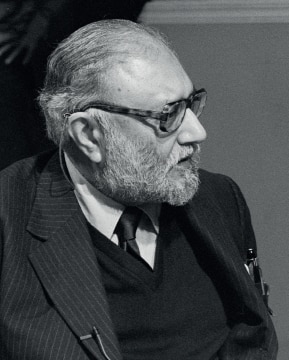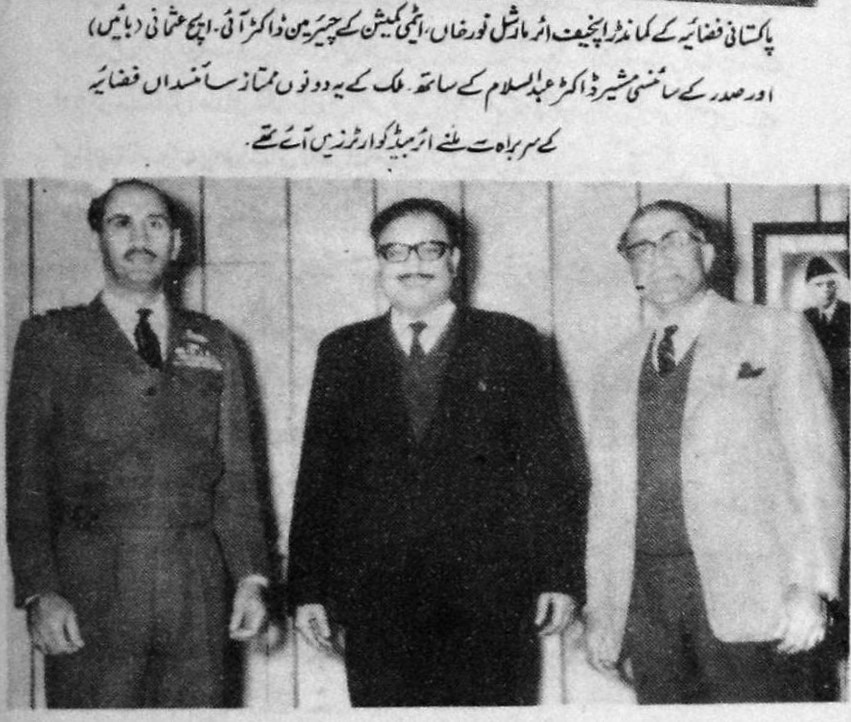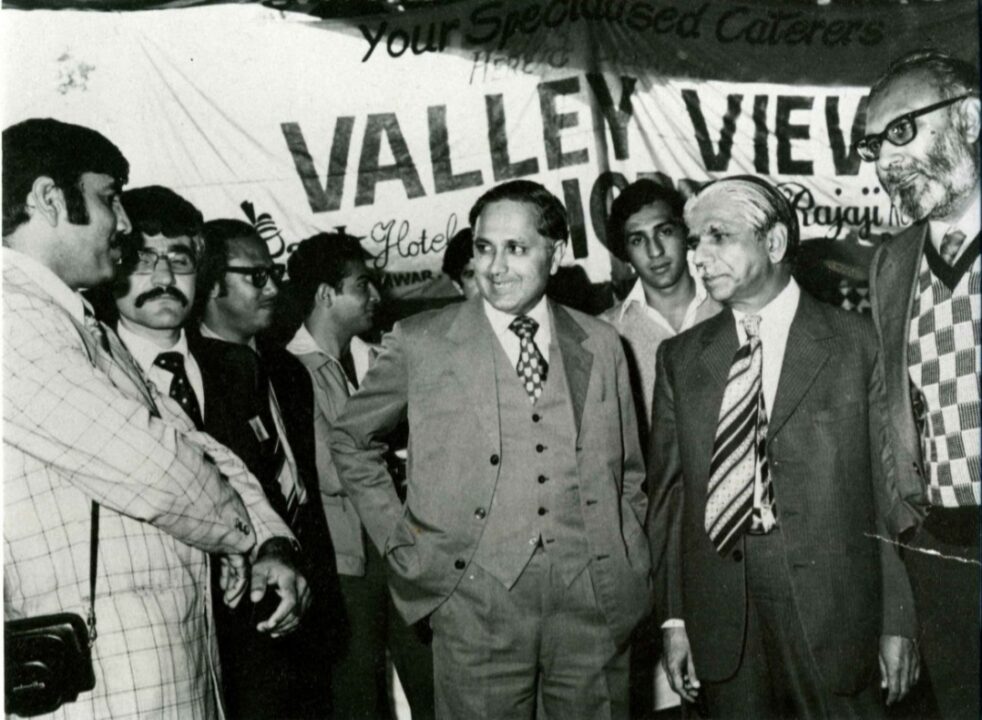Ata-ul-Haye Nasir, Al Hakam

Of the eight nuclear powers of the world, Pakistan was the seventh to announce its nuclear capability on 28 May 1998.
Nuclear tests were carried out at Ras Koh Hills in the Chaghi area of Balochistan and the day was labelled Yaum-e-Takbir (Day of Supremacy); the day is celebrated on the same date every year.
Such milestones are not reached in days or months – experts toil for years to achieve such a feat. Dr Abdus Salam Sahib – a Pakistani theoretical physicist and Pakistan’s first Nobel Prize laureate – also played a pivotal role in Pakistan’s Nuclear Weapons Program.
Pakistan Atomic Energy Commission (PAEC) was established in 1956. Talking about the program, Dr Abdus Salam Sahib said in an interview dated 15 December 1986:
“It was quite clear to us that we had to think of power, nuclear power, right away. And, in the meanwhile, the important point was to get the commission, like all the commissions in the world, to train the manpower in Pakistan. There was no other body in Pakistan that was training people. […]
“Pakistan had no training programs whatsoever in the basic sciences or in applied sciences. And that was the first goal, that [Ishrat Hussain] Usmani and I together were busy with. We got about six hundred people trained under the umbrella of the Atomic Energy Commission.”
He further said:
“The second goal, which was quite clear to us, was to build up laboratories in various research disciplines, the PINSTECH laboratory is just one of them. […] The second achievement was to get a nuclear reactor built in Pakistan, and show that nuclear reactors could be built and operated by Pakistanis safely. […]
“And so, a nuclear power reactor was built in Pakistan, by the Canadians, which is operated by the Pakistanis now […] So, both these ideas were quite successful by the year 1972.” (War and Peace in the Nuclear Age; Carter’s New World; Interview with Abdus Salam, 1986, December 15 1986, GBH Archives, accessed 13 October 2021, http://openvault.wgbh.org)

Shortly after the fall of East Pakistan in 1971 and the preceding war with India, Zulfikar Ali Bhutto called top brass physicists and engineers, including Dr Abdus Salam Sahib, to a meeting held in Multan on 20 January 1972. In that meeting, the idea of a Nuclear Weapons Program was discussed.
Recently, a Pakistani Nuclear Physicist, Dr Pervez Hoodbhoy wrote an article about the contributions of Dr Abdus Salam Sahib with regard to the Nuclear Weapons Program of Pakistan. He states:
“[O]n Jan 20, 1972, president Zulfikar Ali Bhutto convened a meeting of Pakistani scientists in Multan. An emotional Bhutto exhorted them to make an atomic bomb, a desire he had first articulated in 1965. Salam was present and also spoke.” (“Abdus Salam in China”, 30 November 2019, www.dawn.com)
A well-known journalist, Shahid-ur-Rehman wrote a book Long Road to Chagai (1999) based on interviews of those who played a crucial role in Pakistan’s Nuclear Weapons Program. He also interviewed Riazuddin (who served in the Pakistan Atomic Energy Commission), in which he narrated details of the early steps and stated that after the Multan meeting, Dr Abdus Salam Sahib visited Pakistan for another meeting with Zulfikar Ali Bhutto and the Chairman of the Pakistan Atomic Energy Commission, Munir Ahmad Khan.

In late September 1972, Dr Abdus Salam Sahib called Riazuddin and Masud Ahmad, to his office at the ICTP in Trieste, Italy. He informed them about the Pakistani government’s decision to start working for nuclear development. He also instructed Riazuddin to create a group of theoreticians for understanding the physics of nuclear implosions. Dr Abdus Salam Sahib instructed Masud Ahmad to return to Pakistan and join PAEC.
Dr Abdus Salam Sahib not only laid the foundations of Pakistan’s Nuclear Weapons Program but continuously supported it as well. Norman Dombey said:
“When Salam was first appointed by Ayub Khan as Presidential Science Advisor, he and [Ishrat Hussain] Usmani had worked closely together to establish civil nuclear power in Pakistan and had set up the Pakistan Institute of Nuclear Science and Technology (PINSTECH) at Nilore, near Islamabad, whose first reactor went critical in 1965. […]
“As Presidential Science Advisor Salam naturally played a central role in Bhutto’s principal scientific project after January 1972, namely the nuclear weapon programme. Furthermore, there is substantial evidence to back this up.” (Abdus Salam: A Reappraisal Part II – Salam’s Part in the Pakistani Nuclear Weapon Programme, Physics and Astronomy Department, University of Sussex, 10 December 2011)
Moreover, “he not only accepted its logic that Pakistan’s nuclear weapons were necessary given that India had overwhelming conventional capability but actively helped to achieve the programme’s goal.” (Ibid.)
The article by Dr Pervez Hoodbhoy, cited earlier, also brings to life two Chinese physicists, Jinghan Sun and Xiaodong Yin, who gave details about the role of Dr Abdus Salam Sahib in Pakistan’s Nuclear Weapons Program in their paper titled Abdus Salam and China – A View on Salam’s Influence on China’s Science Development Based on His Six Visits to China. This was published from Beijing in March 2019.
These authors have drawn on transcripts of various meetings held at the Chinese Academy of Sciences and revealed Dr Abdus Salam Sahib’s efforts to seek China’s help for Pakistan’s Nuclear Weapons Program.
Zulfikar Ali Bhutto sent Dr Abdus Salam Sahib to China in 1972 to seek China’s help in regard to the nuclear weapons technology. The authors of the above mentioned paper state that during that visit Dr Abdus Salam Sahib met with the Chinese Premier, Zhou Enlai on 5 September 1972, and discussed assistance from China for Pakistan with regard to becoming a nuclear power.
Dr Yangyang Cheng, a Research Scholar in Law and Fellow at Yale Law School’s Paul Tsai China Center, stated:
“Why did Salam help Pakistan acquire nuclear weapons? […] Maybe Salam believed that nuclear weapons were a necessary evil to protect his country and its people. Maybe he saw the state’s interest in the Bomb as an opportunity to develop Pakistan’s scientific infrastructure. […]
“Salam was not a dissident. His country had turned its back on him because of who he was and how he prayed. But whenever he could, Salam had worked with the Pakistani government to advance science and education in his country.” (The Holy and the Broken, SupChina [now The China Project], 30 October 2019)
While describing Dr Abdus Salam Sahib’s services for Pakistan, Nayyar Afaq states:
“Some of his services, for instance, include working as the science advisor for President Ayub Khan to lay the infrastructure of science in Pakistan. He persuaded him to acquire Karachi Nuclear Power Plant (KANUPP) – the first commercial nuclear reactor of Pakistan. He served as a founding director of Pakistan Space and Upper Atmosphere Research Commission (SUPARCO), worked for the establishment of Pakistan Atomic Energy Commission (PAEC) and The Pakistan Institute of Nuclear Science and Technology (PINSTECH). Not to mention that he mentored the scientist who designed the atomic bomb for Pakistan.” (Dr Abdus Salam and all the wrong choices Pakistan made, The Express Tribune, 29 January 2016)
The opponents of Ahmadiyyat raise an allegation that Dr Abdus Salam Sahib sold Pakistan’s nuclear secrets to other countries, but they are unable to provide any proof to support this claim.
Dr Pervez Hoodbhoy said:
“That Salam palmed off Pakistan’s nuclear secrets to other countries is a flat lie created by those very persons who were actually into this business and were thereafter exposed.” (Abdus Salam in China, Dawn, 30 November 2019)
The opponents try to snatch the credit from Dr Abdus Salam Sahib, in regard to Pakistan’s Nuclear Weapons Program. Although, many people have contributed to this project, the role of Dr Abdus Salam Sahib can never be denied. He had played a great role in laying the foundations of Pakistan’s Nuclear Weapons Program, and as stated by The Express Tribune, mentored the scientist who worked to design the atomic bomb.
Unfortunately, Dr Abdus Salam Sahib never got the due appreciation he deserved from his country and is now among the unsung heroes of the nation. Why? Merely for being an Ahmadi Muslim.

